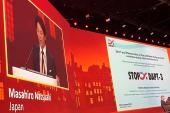Unguided De-escalation, Short DAPT the Best Strategies in ACS: Meta-analysis
More research is needed on de-escalation strategies to find the “sweet spot” of risk and benefit, says Davide Capodanno.

When choosing a dual antiplatelet therapy (DAPT) strategy in patients with ACS, a new network meta-analysis suggests that “unguided” de-escalation is associated with the lowest risk of both MACE and major or minor bleeding. Additionally, compared with standard or extended DAPT, a short course of DAPT followed by P2Y12 inhibitor monotherapy is linked to the lowest risk of major bleeding and all-cause death.
DAPT after ACS has been the focus of several recent studies like TOPIC, STOPDAPT-2 ACS, and TICO as well as meta-analyses, with no definitive strategy yet accepted. And though the limited research published regarding how genotype and platelet function testing can help guide treatment decisions, access to these technologies remains limited for cost and expertise reasons alike.
Current US and European guidelines, the latter of which were just updated last week, only support a short course of DAPT followed by P2Y12 inhibitor monotherapy for patients considered to be at high risk of bleeding. De-escalation is supported in both regions’ clinical guidelines with class IIb or IIa evidence depending on how it’s done (eg, by switch or dose reduction).
With so much research already out there, lead author Toshiki Kuno, MD, PhD (Montefiore Medical Center, Albert Einstein College of Medicine, Bronx, NY), told TCTMD that what was missing was a study that separated out the unguided de-escalation strategies—those that don’t involve genotyping or platelet function testing—based on which antiplatelet agent the patients continued to receive, be it clopidogrel or one of the other more potent P2Y12 inhibitors like ticagrelor or prasugrel.
“Of course, there are no randomized trials comparing [unguided de-escalation with short-term DAPT followed by P2Y12 inhibitor monotherapy], because both are good strategies and we do not think it's going to show some major difference,” Kuno said. “De-escalation could be good but it's not good for pharmaceutical companies, so nobody will pay for the trial.”
While the methodology of this network meta-analysis “increases the power” of the individual trials included, Davide Capodanno, MD, PhD (University of Catania, Italy), told TCTMD, “there is always the risk to see the forest and not the trees, as some would say. You also amplify the problems, the issues, of the single studies to get that unified message but in the end you lose their nuances.”
Despite that, Capodanno, who co-wrote an editorial accompanying the paper, called this study’s message “a call to remember that de-escalation strategies are different—they may have some pros and cons and different targets and objectives.”
The study and the editorial were published online recently in Circulation: Cardiovascular Interventions.
Meta-analysis Findings
Included in the meta-analysis were 32 randomized controlled trials comprising 103,497 ACS patients treated using one of the following strategies:
- Standard DAPT with clopidogrel, prasugrel (standard/low dose), or ticagrelor for 12 months
- Extended DAPT for at least 18 months
- Short DAPT of no more than 6 months followed by P2Y12 inhibitor or aspirin monotherapy
- 12 months of DAPT with unguided de-escalation from potent P2Y12 inhibitors to low-dose potent P2Y12 inhibitor or clopidogrel at 1 month
- Guided DAPT with genotype or platelet function tests
There were no differences in the primary efficacy outcome of MACE (cardiovascular death, MI, or stroke) among the strategies of short DAPT, unguided de-escalation, and guided selection, but unguided de-escalation reduced the risk of this endpoint compared with standard DAPT using either clopidogrel (HR 0.67; 95% CI 0.49-0.93) or ticagrelor (HR 0.68; 95% CI 0.50-0.93).
Compared with the other strategies, the risk of the primary safety outcome of major or minor bleeding was lowest both for short DAPT followed by P2Y12 inhibitor (HR 0.66 vs guided selection; 95% CI 0.47-0.93) and unguided de-escalation (HR 0.48 vs guided selection; 95% CI 0.33-0.71). Also, the risk of major bleeding and all-cause death was lower with short DAPT followed by P2Y12 inhibitor monotherapy compared with both standard (HR 0.64; 95% CI 0.42-0.97) and extended DAPT (HR 0.60; 95% CI 0.44-0.82).
Unguided de-escalation was the safest and most effective strategy in reducing MACE and major or minor bleeding while short DAPT followed by P2Y12 inhibitor monotherapy was best for the endpoints of major bleeding and all-cause death.
Comparing De-escalation Strategies
In their editorial, Capodanno and Claudio Laudani, MD (University of Catania), point out the “noise” introduced into this study with the wide variety of strategies employed by all the included studies. Still, they write, it “seems plausible and perhaps not surprising that the de-escalation strategies reduce bleeding compared with standard DAPT.”
They argue that regardless of which strategy is chosen, “the focus must remain on personalized medicine.”
For de-escalation specifically, “one might consider the unguided de-escalation strategy by switch or dose reduction as the routine strategy for all patients and aspirin discontinuation for those at high bleeding risk or low ischemic risk,” the editorialists write. “A well-powered, large-scale randomized trial comparing these strategies is warranted to definitively ascertain their relative efficacy and safety.”
Capodanno stressed the need for this research.
“It would be nice to have a direct comparison in patients at high bleeding risk to see whether one or the other finds a sweet spot in terms of major adverse cardiac events,” he said. “Obviously some of them make you bleed less, but then in the end it's about the thrombotic endpoints as well because you do not want to expose people to higher risk just because you are discontinuing. The net benefit is not yet the endpoint for these trials but something that is powered for both—bleeding and maybe noninferiority on MACE—that would be ideal when comparing de-escalation strategies.”
Yael L. Maxwell is Senior Medical Journalist for TCTMD and Section Editor of TCTMD's Fellows Forum. She served as the inaugural…
Read Full BioSources
Kuno T, Watanabe A, Shoji S, et al. Short-term DAPT and DAPT de-escalation strategies for patients with acute coronary syndromes: a systematic review and network meta-analysis. Circ Cardiovasc Interv. 2023;16:e013242.
Capodanno D, Laudani C. Unraveling the maze of de-escalation strategies in acute coronary syndromes. Circ Cardiovasc Interv. 2023;16:e013461.
Disclosures
- Capodanno reports receiving speaker’s fees or honoraria from Novo Nordisk, Sanofi, and Terumo.
- Kuno and Laudani report no relevant conflicts of interest.





Comments